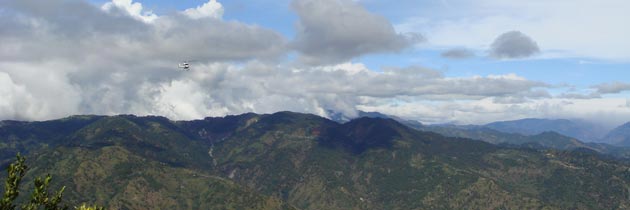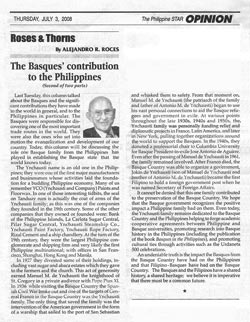 Artetsu Saria 2005
Artetsu Saria 2005
Arbaso Elkarteak Eusko Ikaskuntzari 2005eko Artetsu sarietako bat eman dio Euskonewseko Artisautza atalarengatik
 Buber Saria 2003
Buber Saria 2003
On line komunikabide onenari Buber Saria 2003. Euskonews y Media
 Argia Saria 1999
Argia Saria 1999
Astekari elektronikoari Merezimenduzko Saria

(First part)
We are a nation of culture and lenguages; having over 100 different dialects with accompanying differences in customs and social mores. Within Metro Manila alone, we can see in places such as Greenhills Mall in Ortigas different religion (Muslim and Christian) living side by side. Much like the wave of nouvelle cousine, we are a fusion nation.
There is a social and ethnic group in the Philippines that few are aware of: the Basques. We have long seen them as Kastilas, failing to differentiate between Basques and Spanish. But let there be no mistake, the Basques are their own people, with their own lenguage (Euskera), their own architecture, their own myths and culture. The Basque Country operates as an Autonomous Region north of Spain, complete with its own government.
From the very first Spanish voyage to the Philippines led by Magellan they were here. Juan Sebastian Elcano, the first to circumnavigate the world, was a Basque from the province of Guipuzcoa. Most of the crews in that expedition were Basque; as was the case with subsequent voyage. In 1565, the Urdaneta-Legazpi expedition arrived; both of whom were Basque. A good number of our Governor-generals were Basque, including Luis Lardizabal who set up the province of Nueva Vizcaya (named in honor of the Basque province, Biscay) and Simon Anda de Salazar, who was called by noted Philippine historian Eulogio Rodriguez as one of the best governor-generals in our history. Today, many of the largest and nost successful companies are Filipino-Basque owned or were founded by Basques. From Elcano first coming to the Philippines to the time when Urdaneta and Legazpi set into motion the evangelization and development of the country, we may have been a Spanish territory but we were a Basque nation.
It is readily apparent from place names to family names the effect the Basques had on the country. Basques from the Basque Country created the Philippines, but what many do not know is that a Basque family from the Philippines helped create the modern Basque state. We are sure everyone has noticed the celebration of the 5th Century of Friar Andres de Urdaneta which is going on this year. The Philippines celebration was actually initiated through the efforts of Antonio M. de Ynchausti and organized together with the national Commission on Culture and the Arts, the Augustinian Province of Sto. Niño de Cebu, Instituto Cervantes, University of San Carlos and San Agustin Museum.
(Second part)

Last Tuesday, this column talked about the Basques and the significant contributions they have made to the world in general, and to the Philippines in particular. The Basques were responsible for discovering one of the most important trade routes in the world. They were also the ones who set into motion the evangelization and development of our country. Today, this column will be discussing the role one Basque family from the Philippines has played in establishing the Basque state that the world knows today.
The Ynchausti name is an old one in the Philippines; they were one of the first major manufacturers and businessmen whose activities laid the foundation for a budding Philippine economy. Many of us remember YCO (Ynchausti and Company) Paints and Floorwax. In one of those interesting tidbits, the seal on Tanduay rum is actually the coat of arms of the Ynchausti family; as this was one of the companies they founded in the 19th century. Some of the other companies that they owned or founded were: Bank, of the Philippine Islands, La Carlota Sugar Central, Pilar Sugar Central, Ynchausti Steamship Co., Ynchausti Paint Factory, Ynchausti Rope Factory, Rizal Cement and a ship chandlery. At the turn of the 19th century they were the largest Philippine conglomerate and shipping firm and very likely the first Philippine multinational; with offices in San Francisco, Shanghai, Hong Kong and Manila.
In 1927 they divested some of their holdings, including vast sugar and abaca estates which they gave to the farmers and the church. This act of generosity earned Manuel M. de Ynchausti the knighthood of St. Gregory in a private audience with Pope Pius XI. In 1936 while visiting the Basque Country the Spanish Civil War broke out and one of the targets of General Franco in the Basque Country was the Ynchausti family. The only thing that saved the family was the intervention of the American government in the form of a warship that sailed to the port os San Sebastian and whisked them to safety. From that moment on, Manuel M. de Ynchausti (the patriarch of the family and the father of Antonio M. De Ynchausti) began to use his vast personal connections to aid the Basque refugees and government in exile. At various points througout the late 1930s, 1940s and 1950s, the Ynchausti family was personally funding relief and diplomatic projects in France, Latin America, and later in New York, pulling together organizations around the world to support the Basques. In the 1940s, they donated a professorial chair to Columbia University for Basque President-in-exile Jose Antonio Aguirre. Even after the passing of Manuel de Ynchausti in 1961, the family remained involved. After Franco died, the Basque Country was able to organize a government Jokin de Ynchausti (son of Manuel de Ynchausti and brother of Antonio M. de Ynchausti) became the first Filipino to hold a foreign government post when he was named Sebretary of Foreign Affairs.
It cannot be denied that this one family contributed to the preservation of the Basque Country. We hope that the Basque government recognizes the positive impact a Philippine family had on them. Even today, the Ynchausty family remains dedicated to the Basque Cuntry and the Philippines helping to forge academic cooperative agreements between Philippine and Basque universities, promoting research into Basque history in the Philippines (including the publication of the book Basques in the Philippines), and promoting cultural ties through activities such as the Urdaneta 500 celebrations.
An underniable truth is the impact the Basques from the Basque Country have had on the Philippines and that Filipino-Basque have had on the Basque Country. The Basques and the Filipinos have a shared history, a shared heritage; we believe it is imperative that there must be a common future.